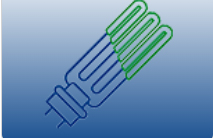Scale Control

The formation of lime scale in water systems is estimated to cost UK industry in excess of one billion pounds per year. These costs are the direct result of plant repair, replacement of equipment and lost production or lost revenue due to downtime for the site.
In addition to these costs, there are significant hidden costs too, probably well in excess of this figure. These costs arise due to the inefficiency of heat transfer in hot water generation plant, which increase the energy requirement and the increased demand on pump booster sets. Lime scale is a very good insulator and even a small amount on a heat transfer surface, will reduce the efficiency of the heat transfer process. Several sources estimate that even 1mm of lime scale on a heat transfer surface can reduce the efficiency of heat transfer by 7 to 8%, in turn this means that fuel efficiency is reduced and consequently both fuel consumption and carbon dioxide emissions will increase, neither of these is desirable. To compound this wastage, when scale forms on the inside of pipe work, it not only reduces the effective diameter of the pipe, but it also increases the surface roughness compared to the base metal. Both of these effects will increase the cost of pumping water through the pipes, either by increasing the required water velocity or by increasing frictional losses within the system. This will further add to the operational cost and unnecessary production of carbon emissions. When scaling problems occur, they can be the source of considerable inconvenience for the operator of the system and those that use the services; imagine the disruption caused by the loss of hot water to a hotel, hospital or care home for example.
The accumulation of scale however presents not only environmental, financial and operational problems; they can also have a significant impact on biological conditions within the water system. Lime scale can provide a habitat for bacteria colonies to become established in and can provide nutrients for their metabolisms.
It is known that many bacteria, including legionella pneumophila, the bacterium responsible for legionnaires disease can often be found in scaled areas of systems, such as the base of calorifers and strainers in thermostatic mixer valves in particular.
For these reasons the Health and Safety Executive’s guidance on legionnaire’s disease – ‘The control of legionella bacteria in water systems’ approved code of practice and guidance’ (also known as the ‘ACOP L8’) states that some form of scale control must be used if the water is deemed to be scale forming, this means that if a risk assessment of the system shows that scale formation is likely, then it is a requirement to take scale prevention measures to mitigate against this. In addition to this the building regulations require scale control measures on new and refurbished systems where the total water hardness of the water exceeds 200ppm. There are several methods of scale control, but these can principally be put in three categories:
- Scale control via Physical Water Conditioning
- Scale control via Base Exchange Water Softening
- Scale control via Chemical Dosing
Physical Water Conditioning
Physical water conditioners are designed to prevent the accumulation of hard water scale in calorifers and other water heating equipment. As the name suggests this is a physical process which modifies the structure of minerals responsible for lime scale into a form, such that scale formation does not occur, the great advantage of this process is that potable water treated in this way remains wholesome and thus does not give rise to any potential health issues. Additionally, operational cost will be lower than for water softening as there are no chemical regenerant costs.
Base Exchange Water Softening
This is an alternative method for combating scale accumulation in water systems. The process works by chemically modifying the water, by replacing the scale forming minerals with other salts that cannot form scale. Treatment by this technique will be required for certain critical applications, such as steam generation and reverse osmosis systems. According to the Drinking Water Inspectorate (DWI), water produced by this technique is not suitable for potable supply, a factor which needs to be taken into account, during the design of water systems.
Chemical Dosing
This is a little used method of scale control. The technique works by introducing treatment chemicals into the water supply that affect or counteract the normal crystallisation process of scale deposition and growth. Potable grade chemicals are available; however the technique is usually a balance between effectiveness and potability.